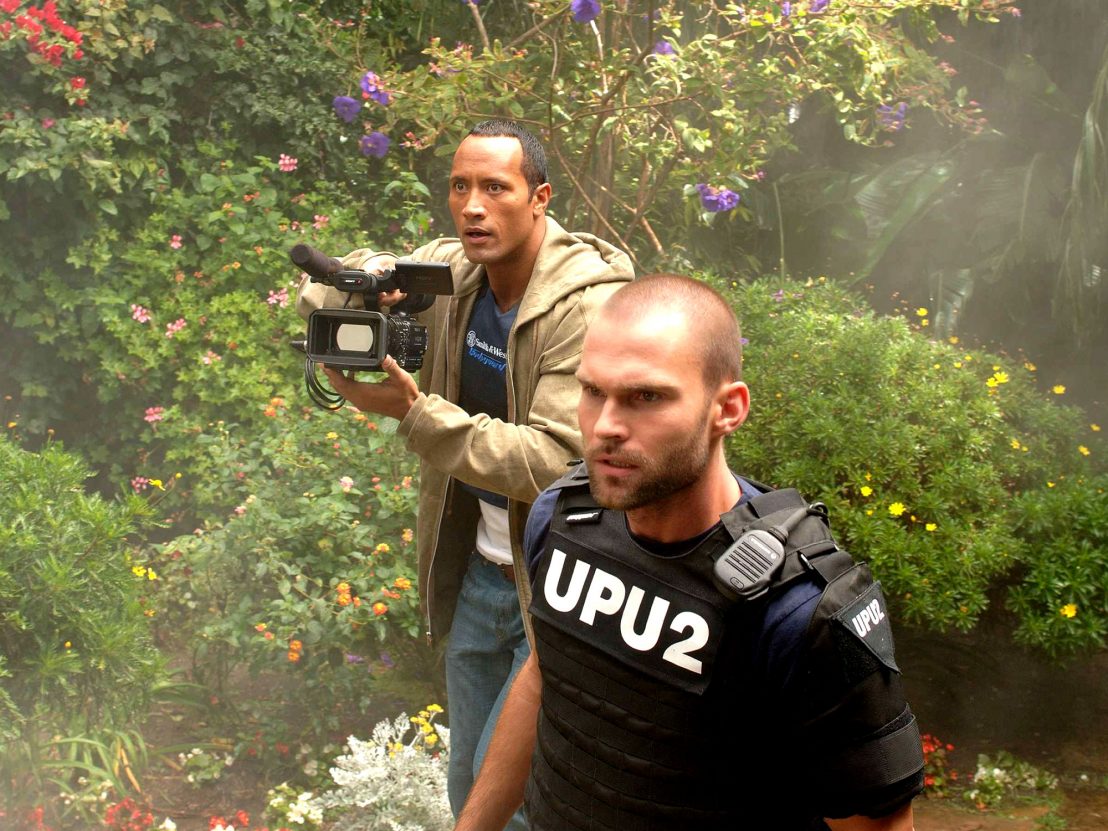
It’s November 2016, and Richard Kelly is sat in a Los Angeles restaurant dining with a newspaper journalist. They talk a little about the cult consensus surrounding the reissue of his 2001 debut, Donnie Darko, but the main topic on the table is Kelly’s reemergence following a long period of inactivity. Both writer and subject are eager to discuss the director’s ill-fated second feature, Southland Tales, which celebrates its tenth anniversary this year.
Endeavouring to reappraise the film, the journalist would later dub it “a pre-game show for the next decade of global misery” when he finally put pen to paper. Revisiting Southland Tales in 2017, however, it’s not only the speculative powers of the film that sing. What also resonates is the quiet conflict between commercial and contextual providence when we’re trying to read popular cinema, to hold it up against the world.
Kelly’s playbook, defined as it is by hypothetical disorder, frames an associative reservoir of contemporary symbolisms in which critics will swim. Searching for a sense of the inherent value of Southland Tales, some look for its hidden depths; others, the flat veneer of its surface. But the absence of consensus around the film feels entirely appropriate.
Taking the newsfeed as a stylistic turn, Southland Tales weaves together various subplots, dead-ends, and vignettes in the form of a rolling newscast. Set against the backdrop of nuclear war in America – the bomb having landed in Abilene, Texas – we find a country in meltdown. State borders are closed, and extensions of the Patriot Act have allowed intelligence services to function unmonitored. On the west coast, a neo-Marxist revolution is falling into chaotic failure around Venice Beach, and an actor named Boxer Santaros (Dwayne Johnson) – having married the debutante of some Republican house of cards – has lost his memory. Now hiding out in Los Angeles, he runs with Krysta Now (Sarah Michelle Gellar), an ambitious and entrepreneurial ex-porn star.
Together, Gellar and Johnson are penning a screenplay, a cop movie entitled ‘The Power’. But amid its attention to the trappings of genre, the script holds some answers to a spiritual foreboding prompted by an impending energy crisis stayed, only, by the numinous capabilities of a scientist (Wallace Shawn). A figure shrouded in a fog of incense, mystic vagaries and influence owing to the financial backing of a mysterious German multinational.
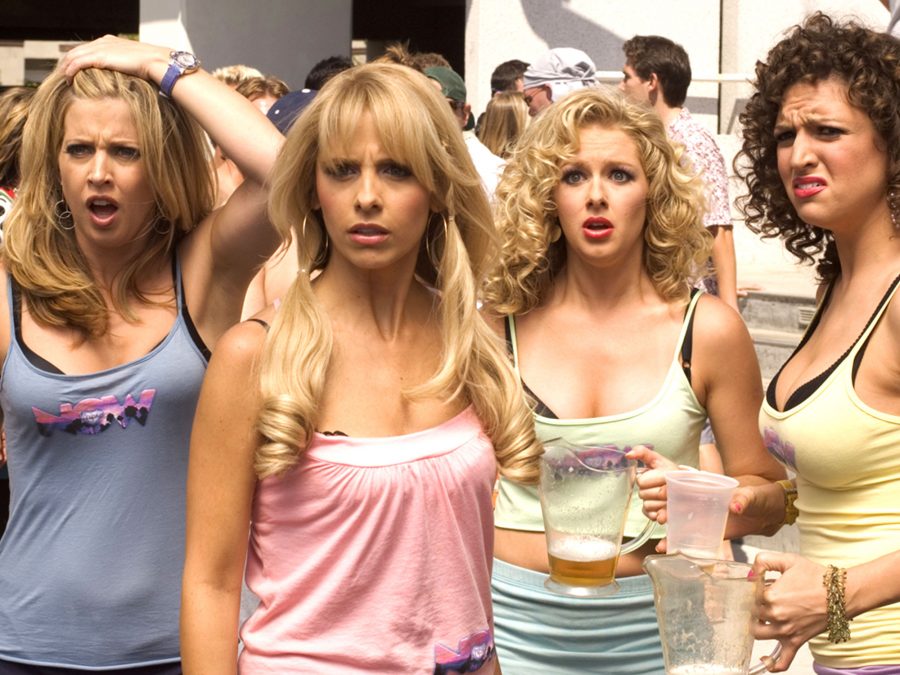
Seann William Scott stars as two police officers who are not allowed to meet, should they rupture a temporal continuum, and the film is ambiently scored by hotel lobby-era Moby. Justin Timberlake, playing a misanthropic Iraq War veteran, establishes the dynamics of the film’s dénouement. Rather than place or time, Timberlake instead reads us a bastardisation of the Book of Revelation fused, throughout, with misquotes from high-modernist poetry. Repeatedly, he tells us that “this is the way the world ends.”
Southland Tales is a time capsule flirting with end-of-history ideologues. It is a joke on the very idea of the running order of recent history. Self-identifying as a parable playing on a cultural implosion of operatic proportions, it runs as a look-book of early 21st century anxieties. It’s a speculative three-act riff on the catastrophic failings of the last 10 years, a fever dream in two hours and twenty-five minutes. Kelly’s film is a carrion call for a new culture of private consumption. Its characters can do little but watch one another, and the film milks its ignoble examination of mass consumerism through depiction of a dystopian reality defined by tragic inevitability and heavy self-consciousness. “I feel like sometimes things just need time to marinate,” Kelly has said; he always wanted us to read the film forwards.
This is a murky film, no question, but Kelly has suggested that key to understanding its meaning is the intellectual scope of its centrepiece scene: a three-minute dance routine. Around the halfway mark, a doped-out Timberlake slips into an opiate induced coma. In a fantasy sequence – blood down his shirt, Budweiser in hand – he dances through a thoroughly 20th century panorama, a pinball arcade, flanked by a chorus of dancers all legs and vinyl. He looks straight down the camera, lip-syncing his way through The Killer’s ‘All These Things That I’ve Done’, whose anthemic drive is matched only by the empty opacity of its lyrics. “All these things that I’ve done” – the song is about meaning read backwards, the ownership of experience, an inversion of the speculation showcased throughout Southland Tales. The engagement of its terms here feels like a play on use-value; it’s a psalm for our private habits as viewers.
If watching rather than knowing is our active-verb in Southland Tales, then the song proves vital. Meaningless in its aim for universalism, a pop song only resonates in the right room, when played in the right context, and recalling it – personalising its terms – becomes a statement of value. That’s a perfect picture of the vitality of Southland Tales – a vigorous piece of pulp for the 21st century, it courts that very idea. It wants to be used; the film wants to mount a consideration of the cumulative character of meaning, how popular cinema is always contingent on popular feeling.
At first, what we have seems like a mess of ideas. But give it time, let those ideas marinate, and we’re left with something more. Kelly’s joke, still intact 10 years later, is that there will always be a solitary ‘I’ as far as consumption is concerned. In 2007, Southland Tales was simply out of step, waiting for new platforms for personal entertainment, for the semiotic carry-on instigated by streaming cultures. It’s a film honed for the minute when cinema would feel more like a private habit than a public spectacle.
Published 23 Apr 2017
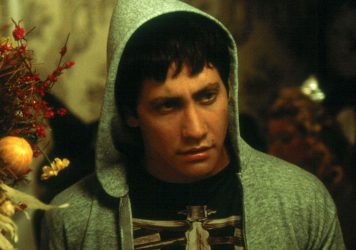
By Greg Evans
Greg Evans recalls how Richard Kelly’s 2001 film exposed him to the endless possibilities of cinema.
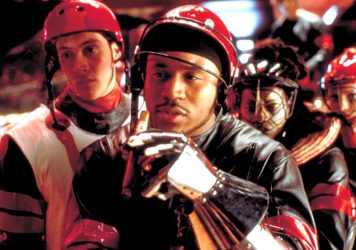
By Nadine Smith
John McTiernan’s maligned 2002 remake is one of the sharper anti-capitalist films of modern times.
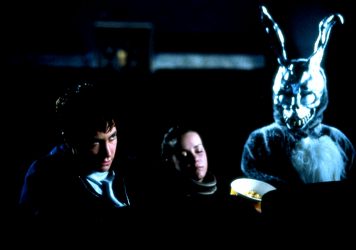
By Dan Einav
The director apparently has unfinished business with his cult favourite from 2001.